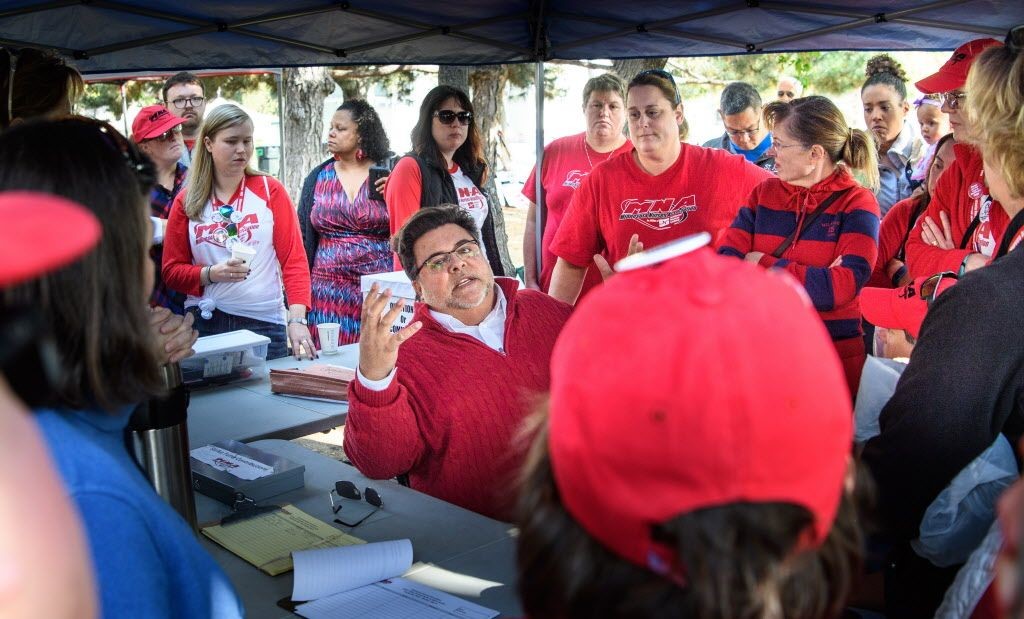
Bargaining & Strikes
Bargaining & Strikes
Unions lead employees to believe that if the union wins an election, then the union will negotiate with their employer and automatically get employees better wages, benefits and working conditions. Unions, including the NNU, like employees to believe that with them, things will only get better. No one can predict what the NNU may or may not promise during an election campaign. However, while the employer is required to bargain in good faith, it does not have to agree to anything it doesn’t believe is in the best interest of patients, the employees or the hospital. For example, the NNU will often claim that they will get specific RN-to-patient staffing ratios in a contract, only to agree to a contract without set staffing ratios. The contract attached in the section entitled “Collective Bargaining” is a good example of contract without set RN-to-patient staffing ratios.
Most unions downplay the possibility of a strike. In its organizing materials, the NNU states that strikes are “rare and typically last one to three days.” Strikes, however, are real and they can happen when the parties are unable to reach an agreement during collective bargaining negotiations.
A look at the history of the NNU and its affiliates tells the real story of strikes by this union.
In June 2017, NNU affiliate the Minnesota Nurses Association called a seven-day strike at five hospitals in the Allina Health System. The dispute was, in part, over Allina’s proposal to eliminate a union-backed health insurance plan and replace it with a plan offered to other Allina employees. This proposal continued to be in dispute when the NNU affiliate called another strike on September 5, 2016, which lasted six weeks. The contract that was eventually ratified called for the union-backed plan to be phased out by 2019.
The Star Tribune reported on October 11, 2016, the following nurse reaction at a ratification vote: “Sounds like a cave. Don’t do it,” said nurse Deanna Pulver on the Minnesota Nurses Association Facebook page. “What was the purpose of the past 6 weeks then?”

(Photo: Glen Stubbe, Star Tribune) Robert Pandiscio, director of field operations for Minnesota Nurses Association, explained the tentative contract to skeptical and sometimes angry union members in a park near Abbott Northwestern Hospital.
In December 2013, the NNU called a national day of action with strikes, picketing and protests targeting another health care system’s seven facilities. The NNU called a strike at four hospitals, organized picketing at two others and held press conferences outside yet two additional hospitals, all on one day.
Of course, there are one-day strikes called by the NNU. There can also be open ended strikes called by a union. For example, according to a Minnesota Public Radio News article, in 2010, Minnesota Nurses Association, an NNU affiliate, called an open ended strike of 12,000 nurses at 14 different hospitals in the Twin City area. The strike was avoided when the nurses voted on a contract with lower wages than their union was demanding (0% in the first year, 1% in the second year, and 2% in the third year) and without the nurse-to-patient ratios the union had sought.
Strikes are not easy on employees or their employer. Even though a labor union must give a 10-day advance notice of a strike in a health care institution, strikes can be disruptive to patients, families and communities. A hospital’s reputation and their quality of services are often attacked by a striking union as a way to pressure the employer during a strike.
It is also important to know that during an economic strike, employees are not paid and may have to pay the entire premium for any medical insurance and other employer paid-benefits. Employees also do not qualify for unemployment compensation and permanent replacement employees could be hired to replace the economic striker. Unfortunately the NNU has shown its propensity for strikes, picketing and protests as a way to pressure an employer during negotiations.
In addition to striking, the NNU also likes to call for days of protest and picketing to try and cast the employer in a negative light within their community. There is little doubt that the negative statements made during strikes, pickets and protests could have long-term detrimental effects for a health care employer’s reputation and business.
We are not saying that there would ever be a strike at one of our hospitals, but you should know about the union’s past strike history.